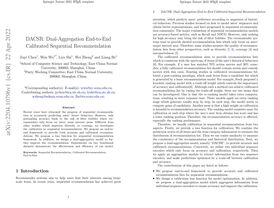DACSR: Decoupled-Aggregated End-to-End Calibrated Sequential Recommendation
Sequential recommendations have made great strides in accurately predicting the future behavior of users. However, persuading accuracy alone may bring side effects such as unfair and overspecialized recommendation results. In this work, we focus on the calibrated recommendations for sequential recommendation, which is connected to both fairness and diversity. On the one hand, it aims to provide fairer recommendations whose preference distributions are consistent with users' historical behaviors. On the other hand, it can improve the diversity of recommendations to a certain degree. But existing methods for calibration have mainly relied on the post-processing on the candidate lists, which require more computation time in generating recommendations. In addition, they normally sacrifice the accuracy to improve the calibration, because they fail to establish the relationship between accuracy and calibration. To handle these problems, we propose an end-to-end framework to provide both accurate and calibrated recommendations for sequential recommendation. We design an objective function to calibrate the interests between recommendation lists and historical behaviors. Therefore, the sequential recommendation model can be trained by accuracy and calibration simultaneously, and generate calibrated recommendations without the post-processing stage. Moreover, we design a decoupled-aggregated model to improve the recommendation. The framework assigns two objectives to two individual sequence encoders, and aggregates the outputs by extracting useful information. Experiments on two benchmark datasets demonstrate the ability of our model to provide accurate and calibrated recommendations. Meanwhile, our model requires less response time than post-processing-based models, which is more efficient.
PDF Abstract
